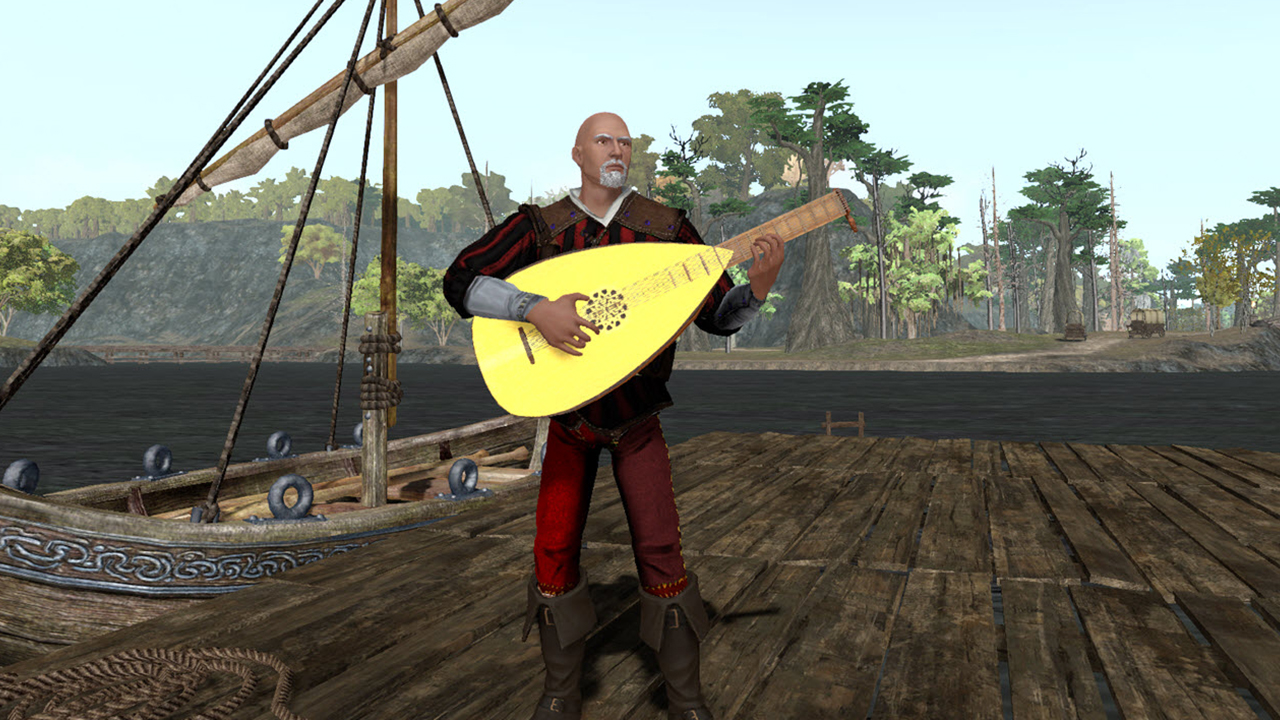Meet the bards whose dedication moved Lord British to tears
How fan musicians became the composers of Garriott's MMO.

In the land of New Britannia there exists a musician of great renown. His name is Holt Ironfell, a grandmaster bard and founder of an alliance of artists with a very special gift. Unlike most bards, whose works are trapped and lost in the memories of those who hear them, the songs written by the Poets' Circle are woven into the fabric of New Britannia itself—no less tangible than the castles and sprawling meadows that stretch across its countryside. Holt Ironfell is just a fictional character in Richard Garriott's MMO, Shroud of the Avatar, but his real-life counterpart, James, doesn't just pretend to be a bard, he is one.
The Poets' Circle isn't your average MMO guild, and Ironfell isn't your average MMO player. Shroud of the Avatar might come from Garriott's imagination, but the music that helps bring it to life comes from theirs. To date, The Poets' Circle has been commissioned to compose over 80 songs that now form the official soundtrack for Shroud of the Avatar. They grew from a haphazard assortment of fans into a troupe of musicians who, right alongside Garriott himself, are shaping a new chapter of roleplay surrounding Lord British. As James tells me, it's a journey that has impacted his life. "Making music for Shroud of the Avatar was the most fun I've had gaming," James says. "It remains a fascinating experience which has brought music full force into my life."
A song for Lord British
There was a time before Holt Ironfell when James was just James, a film student with a passion for roleplaying and an adoration for Garriott's Ultima IV on Commodore 64. He tells me that, growing up, those experiences and Garriott's injection of morality into his games were an important creative inspiration. But where most are drawn to the concept of roleplaying as a heroic warrior or a powerful wizard, James was captivated by the idea of bards. "They're half adventurers and half rockstars," he laughs. "I always liked Garriott's portrayal of them as a kind of rogue."
I didn't even know that we'd end up making the music for the game.
While drawn to their puckish attitude, unlike bards, James didn't have any real affinity or skill for playing music. Instead, he was studying film and loathing every minute of it. "I hated it," he says. "I hated managing all that equipment and shooting video and waiting around on set." While editing one video, he decided to tinker with Garageband, a simple piece of music software, because he was tired of having to navigate copyright laws surrounding the use of music in his films. "I started making very amateurish, self-taught music—I didn't think, at the time, it would go anywhere."
In 2013, Shroud of the Avatar wrapped up a successful Kickstarter campaign that drew in just under two million dollars in funding. Inspired by the campaign's success, James decided to start a guild for amateur musicians like him to play together. "I'm very fond of MMOs. I'd seen guilds really take off when they got in early, and I decided there was obviously an opportunity staring me in the face. I didn't even know that we'd end up making the music for the game."
He began approaching other MMO players who had, for a long time, been making parody songs, covers, and original works based around their favorite games. Slowly, James began collecting a roster of seriously talented musicians, including the likes of Sharm, a WoW parody artist, and the Space Bards (now called Recap), who performed at Blizzcon 2013. Before long, the Poets' Circle was a guild packed with talent and itching to put it to use.
Earlier this year, I spoke with Richard Garriott about the stress of designing what would become a massive MMO using his fans’ money. "It makes you really not want to screw it up," he said. "You feel this much deeper beholding to the backers. You then also realize that there's some chance that this won't work—there's lots of ways this could go wrong. You want to make sure that no one thinks you're wasting their money and you want to provide people as much entertainment along the way just in case it all falls apart."
That conviction led Garriott and Portalarium, Shroud of the Avatar's developer, to pull back the curtain on development and be as transparent as possible. If they failed, Garriott hoped that at least the journey would be an interesting one. To that end, the first pre-alpha release was a single room with a chicken in it. As the months went by and that single room expanded to become New Britannia, one thing stuck out to James and his guild: the music kind of sucked. "They didn't have a plan," he tells me. "They had music, but they didn't have a music director so it wasn't cohesive."
Keep up to date with the most important stories and the best deals, as picked by the PC Gamer team.

Considering that Ultima V's "Stones," a song penned by bowyer and real-life bard David "Iolo" Watson and Kathleen "Gwenno" Jones, became the anthem for a generation of Ultima fans, Shroud of the Avatar's lack of musical direction was disappointing. Two million dollars is far from pocket change, but compared to the average budget for an MMO, it kind of was. Without the money afford a proper musical score, Portalarium began buying generic 'clipart' music from various online libraries.
But Portalarium's transparent process of development inspired people like James to donate more than just their money—they wanted to donate their talent too. Fans began reaching out to Garriott, sending him their compositions to be considered for Shroud of the Avatar. The only problem being that what James and the other artists tried to contribute wasn't much better. "The first time we had people attempt to give us stuff in any of those areas, it wasn't good," Garriott said, explaining that everything players were showing him didn't fit his vision—it was either too modern, too orchestrated, or too atmospheric. After months of rejection, James decided to email Garriott personally and ask a very simple favor: "Tell us what you would like."
"Only at that moment, did I realize what a disservice I had been doing the community," Garriott wrote in an update.
"We asked him to give us a spreadsheet that lists all the zones that he'd need music for and give us a little bit of lore and description about the zones and a 'bounty' of money that he'd pay for each track," James explains.
I was literally moved to tears. In a few short weeks, we went from zero accepted pieces of work, to about 100 percent.
Garriott took the Circle's request seriously, offering a competitive commission for each of the musical scores that he needed for his game. "It quickly turned into an opportunity for Portalarium to engage their community in a very professional way," James says, "and meet in this awesome middleground of, okay, we're going to do this right."
The guild established a board for vetting every single track submitted by the community, developing a rigorous system of critiquing to ensure whatever tracks they passed onto Garriott were the absolute best they could make. After weeks of composing and critiquing, Holt Ironfell and the Poets' Circle approached Garriott with their first selection of songs designed with his feedback. "I was literally moved to tears," Garriott wrote. "In a few short weeks, we went from zero accepted pieces of work, to about 100 percent."
When Shroud of the Avatar's next update released, James and the others logged in to hear their own music accompanying their journey through New Britannia. For James, that was his song Dance of Fawns. "I'd listened to it hundreds of times when composing it but playing the game to it was something else entirely," he says. "It really made the adventure come alive—it was truly magical." For the first time in history, a guild of people roleplaying as bards had, unbelievably, become ones in their own right.
Multiplayer music
As the months went by, Portalarium commissioned 82 songs from the community and Lord British even went so far as to canonize the Poets' Circle by officially recognizing them as the gatekeepers of the Shroud of the Avatar soundtrack. Today, they are a collective of over two dozen musicians of every skill level, sharing and collaborating as part of a guild that has as much life outside of the game as it does within it. "What we've done has never been done, and I think it is the way of the future for making music [in games]," James says, explaining how that collaborations has motivated him to dive deeper into his passion for music, researching theory and composition while also acquiring better equipment. He's now composing for short films as well as his own albums, but hopes the Poets' Circle can also expand their clients beyond Portalarium. And it's there that I think the real beauty of Garriott's MMO is found—how his stories motivate people to create their own. "He breathes life into everything," James says.
My favorite aspect of Ultima was never the games, but the way Garriott made Lord British a character that exists in both fiction and reality. That somehow, impossibly, his worlds can exist beyond my hard drive. For decades, that kind of magic seemed exclusive to Garriott and his friends like David "Iolo" Watson. But Shroud of the Avatar seems to open that possibility to anyone. Perhaps the true legacy of Lord British isn't in the quality of the games he makes, but the way he inspires those who play them to be something more. It's common for the characters we create to be a reflection of us, but how rare and beautiful is it when we become more like them? If you want to know, just ask the grandmaster bard of the Poets' Circle, Holt Ironfell.
With over 7 years of experience with in-depth feature reporting, Steven's mission is to chronicle the fascinating ways that games intersect our lives. Whether it's colossal in-game wars in an MMO, or long-haul truckers who turn to games to protect them from the loneliness of the open road, Steven tries to unearth PC gaming's greatest untold stories. His love of PC gaming started extremely early. Without money to spend, he spent an entire day watching the progress bar on a 25mb download of the Heroes of Might and Magic 2 demo that he then played for at least a hundred hours. It was a good demo.


